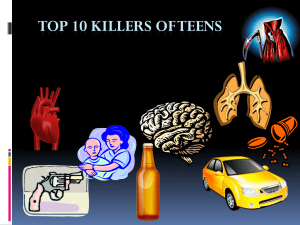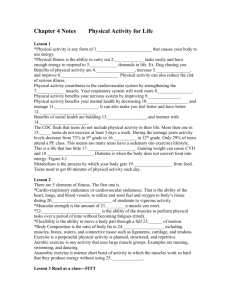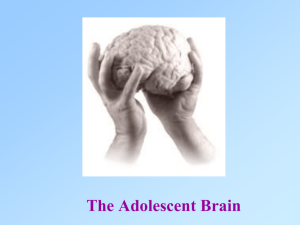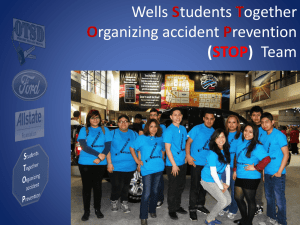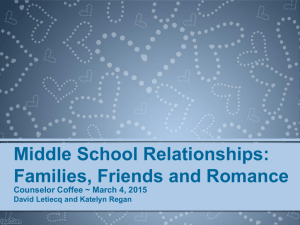Ten Tasks of Adolescence: Development & Challenges
advertisement
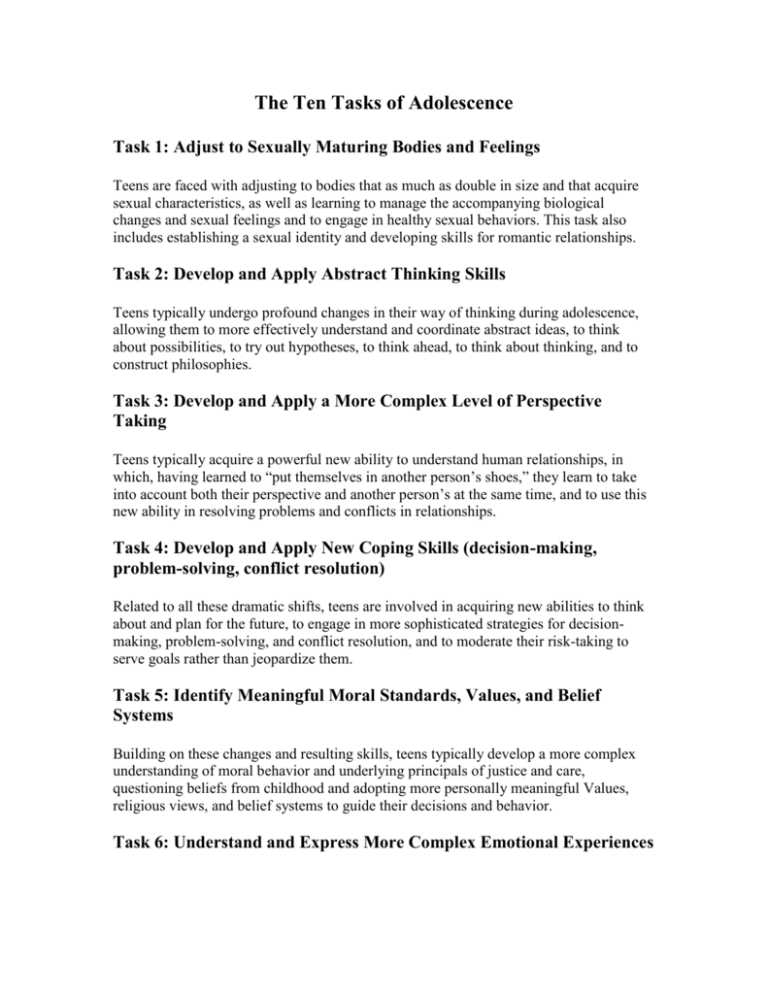
The Ten Tasks of Adolescence Task 1: Adjust to Sexually Maturing Bodies and Feelings Teens are faced with adjusting to bodies that as much as double in size and that acquire sexual characteristics, as well as learning to manage the accompanying biological changes and sexual feelings and to engage in healthy sexual behaviors. This task also includes establishing a sexual identity and developing skills for romantic relationships. Task 2: Develop and Apply Abstract Thinking Skills Teens typically undergo profound changes in their way of thinking during adolescence, allowing them to more effectively understand and coordinate abstract ideas, to think about possibilities, to try out hypotheses, to think ahead, to think about thinking, and to construct philosophies. Task 3: Develop and Apply a More Complex Level of Perspective Taking Teens typically acquire a powerful new ability to understand human relationships, in which, having learned to “put themselves in another person’s shoes,” they learn to take into account both their perspective and another person’s at the same time, and to use this new ability in resolving problems and conflicts in relationships. Task 4: Develop and Apply New Coping Skills (decision-making, problem-solving, conflict resolution) Related to all these dramatic shifts, teens are involved in acquiring new abilities to think about and plan for the future, to engage in more sophisticated strategies for decisionmaking, problem-solving, and conflict resolution, and to moderate their risk-taking to serve goals rather than jeopardize them. Task 5: Identify Meaningful Moral Standards, Values, and Belief Systems Building on these changes and resulting skills, teens typically develop a more complex understanding of moral behavior and underlying principals of justice and care, questioning beliefs from childhood and adopting more personally meaningful Values, religious views, and belief systems to guide their decisions and behavior. Task 6: Understand and Express More Complex Emotional Experiences Also related to these changes are shifts for teens toward an ability to identify and communicate more complex emotions, to understand the emotions of others in more sophisticated ways, and to think about emotions in abstract ways. Task 7: Form Friendships that are Mutually Close and Supportive Although youngsters typically have friends throughout childhood, teens generally develop peer relationships that play much more powerful roles in providing support and connection to their lives. They tend to shift from friendships based largely on the sharing of activities and interests to those based on the sharing of ideas and feelings, with the development of mutual trust and understanding. Task 8: Establish Key Aspects of Identity Identity formation is in a sense a lifelong process, but crucial aspects of identity are typically forged at adolescence, including developing a positive identity around gender, physical attributes, sexuality, and ethnicity as well as sensitivity to the diversity of groups that make up American society. Task 9: Meet the Demands of Increasingly Mature Roles and Responsibilities Teens gradually take on the roles that will be expected of them in adulthood, learning to acquire the skills and manage the multiple demands that will allow them to move into the labor market, as well as to meet expectations regarding commitment to family, community, and citizenship. Task 10: Renegotiate Relationships with Parents/Guardians Although the task of adolescence has sometimes been described as “separating” from parents and other caregivers, it is more widely seen now as adults and teens working together to negotiate a change in the relationship that accommodates a balance of autonomy and ongoing connection, with the emphasis on each depending on the family’s ethnic background. Adapted from Raising Teens: A synthesis of research and a foundation for action. Center for Health Communication, Harvard School of Public Health (www.hsph.harvard.edu/chc/parenting/raising.html)


